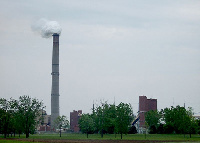The Ultimate Pragmatist in Energy Policy, Dr. Marie Corio

I played on my college squash team in the 1970s, and every year we made the ride up to Cambridge, Mass. to play MIT. Though we routed them every year, the most pleasurable part of the day for me was meeting someone who was twice the math/science mind that I would ever be.
That whole experience just replayed itself, in my meeting with Dr. Marie Corio, CEO of boutique consultancy Applied Economic Research in Brooklyn, NY. Marie is arguably the world’s most senior analyst of coal-fired power plants and the assessment of their lifespan and viability, drawing on her expertise in economics, metallurgy, organic chemistry, and computer modeling. Marie kept me spellbound as I sat, quietly sipping my coffee, and learning everything I could about her exciting vocation.
As I was listening, I realized how our whole conversation fits nicely into the “tough realities” theme that is so important to a rational discussion of clean energy. How practical is it to scrap a brand new coal plant, in a region of the country with few other resources, that will soon (we hope) be recovering from the recession and amping up its demand for power? Doesn’t pragmatism need to sit at the very center of energy policy?
There are 800 coal-fired power plants in the US. Let’s retire the right ones first. And no one is in a better place from which to make that call than Marie.


have coal-fired power plants gotten cleaner with new technologies?
Yes, very much so. But it’s a multi-edged sword, if you will. Putting environmental controls on coal plants actually shortens their lives, adding costs that could have gone to the development of renewables. And, of course, carbon capture/sequestration (“clean coal”) technology is expensive and of dubious value.
“How practical is it to scrap a brand new coal plant”
It may surprise you but this may be an option in the future, possibly within a decade.
Craig, I would guess that Dr. Marie Corio did not mention DCFC (Direct Carbon Fuel Cell) technology, which would more than double the efficiency of the process of converting the energy in coal, or other carbon fuels, in to electricity. When DCFC becomes commercially viable (I believe it will be when not if) it is quite possible that the reduced running/fuel cost made possible with this technology would make it economically and environmentally viable to scrap even a brand new conventional coal fired power station and replace it with this technology.
I recently received an e-mail from a US researcher in this field (formerly with LLNL) in which he stated that US universities are no longer conducting research in this area but the Chinese have five universities working in parallel on DCFC research.
DCFC technology also has the advantage that it has built in CC (carbon capture) making this technology potentially 2.5 to 3 times more efficient than a comparable coal fired power station fitted with CCS fitted and the capital cost of adding CCS would go a long way to covering the cost of a replacement DCFC power station.
Technology wise DCFC is very similar to high temperature hydrogen/methane(integral reforming) fuel cells, except that the process is:
Carbon + air >> electricity + CO2
Instead of :
Hydrogen + air >> electricity + H2)
and DCFC is also about 20% to 30% more efficient than HFC!
Therefore I see no fundamental reason why DCFC cannot be commercialised and it has the great advantage over HFCs that carbon is a heck of a lot easier to store in bulk than hydrogen.
By the way I am also a Pragmatist